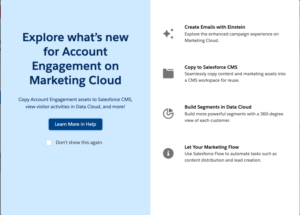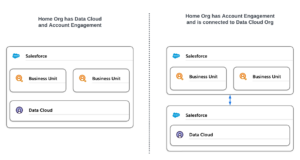Salesforce Business Analyst Certification: Why Should Marketers Care?
- October 18, 2022
- Pardot Certifications, Salesforce Ben | The Drip
On paper, the Business Analyst certification is suitable for “individuals who have 2 years of Business Analyst experience…and 2 years of Salesforce Platform experience.” After a career in Pardot/Salesforce consulting, and having spent years absorbing BA-related content running on Salesforceben.com, I thought I would have a go.
Described as the “translators” between business stakeholders and technology, Business Analysts get to the bottom of what’s required, and more importantly why. Pausing to think – I realized that many of the concepts are relevant to digital marketers – after all, we’re constantly required to translate ideas between our business and prospects/customers, while vying for buy-in between internal teams.
The certification isn’t for everyone that could be reading this guide, however. Here’s how the concepts explored in this certification could make us better marketers.
Salesforce Business Analyst: My “Two Cents”
Although I passed the Business Analyst cert, honestly, I was doubting myself throughout the 65 questions. The questions served up were well-thought out, really getting into the mindset of a BA in different situations (I’ll explain how the questions are designed to trip you up).
The exam covers the following topics (with their weightings):
- Customer Discovery: 17%
- Collaboration with Stakeholders: 24%
- Business Process Mapping: 16%
- Requirements: 17%
- User Stories: 18%
- User Acceptance: 8%

The scores I received varied massively between sections, for example, scoring 92% on “Collaboration with Stakeholders” and only 54% on “User Stories”.
Let’s now dive into how I believe the concepts explored in this certification could make us better marketers.
1. Stakeholder Management
Marketing is a cross-functional role – in other words, we frequently design campaigns on behalf of, or in collaboration with, other business functions. For example, an up-sell campaign targeting customers who have reached 90% product utilization would involve sales, customer success, product teams (for the data), and others.
Team alignment isn’t only for when executing campaigns. Smooth Marketing Ops relies on consensus agreement around processes – like the conversion processes/marketing-sales hand-off. Data needs to be at the correct standard so it is acceptable for all teams to leverage, which includes feedback to marketing. All of these moving parts should be ironed out at the project outset, and “change requests” (requesting a change part-way through the project) should be handled diligently.

As marketers, we rely on others in the business to do their work right to enhance our results. For example, “influenced revenue” relies on the sales team meeting expectations with the marketing-sourced leads; and vice versa, so that marketing are only handing-off leads that meet a level of quality that goes beyond the simple “the prospect is in the right industry and has downloaded our ebook”.
Communication, and other related soft skills, are tested in the BA exam. Although the answer options for these questions make it quite obvious which is the right one, it was a great refresher for stakeholder management – especially when dealing with difficult characters that are waiting to derail your marketing initiative.
The three types of analysis required of a Business Analyst (Enterprise, Strategy, and Stakeholder) are subconsciously being done by marketers on a daily basis. Yet, the upfront effort is worth it to build buy-in from other teams, and their management, rather than the tears and sweat that would have gone into building something that gets blocked at the last mile.
“Successful business analysis postpones solution development until stakeholders agree on well-defined requirements.”
2. Elicitation
Another opportunity to hone in soft skills is elicitation, which is a mix of methods to help you identify user needs at the start of the project, which will help to reconcile user needs at the project’s conclusion.
Elicitation sounds intimidating, but essentially, these are ways to collect information about people, from people:
- Brainstorming
- Focus groups
- Observation
- Prototyping
- And others
“As a business analyst, you first determine the project needs and then choose the elicitation method or methods that support your project the best.”
Have you ever interviewed customers, or held focus groups? If yes, you’re already doing elicitation; plus, by conducting these in different contexts, you would have picked up an instinct for good elicitation.
The likelihood is that you are gathering requirements from a wide number of sources – not only people, but also sources of data to enrich your findings (e.g. Salesforce reports, analytics from data lakes, etc).

Finally, another discovery method is to investigate what your competitors are doing – something I’m sure most marketers do!
3. User Stories
With marketers, the challenge is two-fold: to meet internal user needs and customer demands.
User stories are much like creating personas. The difference is that user stories are snapshots into what the persona wants to achieve in a given scenario, to reach a specific outcome. While this sounds vague, luckily user stories follow a set structure:
As a < who >, I want < what > so that < why >
For example: As a managed services customer, I want to review our hourly usage and view remaining hours on-demand so that I can budget accordingly for the next quarter.
Or: As a marketing manager, I want to approve new campaigns created in Salesforce so that I can ensure all campaigns align with the marketing plan before they are worked on.

Tip: Avoid the word “manage” and opt for a more descriptive verb!
User stories come with multiple benefits, such as helping to prioritize the order that requirements are worked on (i.e. “easy wins” that will bring high value for a relatively low effort), and make the testing phase more effective.
4. User Acceptance Testing
Testing takes a huge chunk of time in the process of launching a campaign. Whether that’s testing a campaign flow on behalf of prospects, or internal system enhancements for the marketing team, marketers need to take this stage seriously to ensure the right data is being captured in the right place, prospects have a seamless experience, and also to avoid downstream impacts on other teams (e.g. the sales team).
“User acceptance testing is end-user testing performed in a sandbox or test environment to verify that a project or enhancement works as intended, and what was originally requested is actually being delivered.”
User acceptance testing (UAT) is the last stage of the project/build before deployment. Applying the appropriate structure to UAT will prevent mishaps down the line.
5. Process Mapping
Marketers are working with a cocktail of systems and people. How can we ensure that prospects take the desired action, and follow the CTAs we’ve laid out like a trail of breadcrumbs?
Process mapping helps marketers to visualize complex ideas instead of using words. Not only is this important for controlling all of the marketing “moving parts”, it’s the key to stakeholder alignment across other teams in the organization.

There are multiple types of process maps – UPN (universal process notation), flowcharts, Unified Modeling Language (UML), value stream maps, Business Process Management Notation (BPMN), SIPOC (supplier, inputs, process, outputs, and customers). For the certification exam, you will be tested on which type of process map to use in a given scenario (e.g. to capture regulatory context).
Then there’s RACI – standing for “responsible, accountable, consulted, informed” – which gives each person involved in a task a level of involvement/accountability. This establishes a clear sense of who should be involved when actioning tasks and for decisions that need to be made along the way. I’ve seen this framework used among marketing teams, and we have adopted it at Salesforce Ben across the whole organization.
6. Documentation
Documentation is no one’s favorite task, and is often seen as something that can be cut from the project timeline. The benefits for marketers to document are numerous, for example, documenting the…
- As-is state is to find where the process needs improvement.
- Interview and elicitation records to capture important information from stakeholders.
- User stories
- Scope statement specification is the most important part – “a clear definition of what needs to be achieved and the work that must be done to deliver the project or product” (source).
- Gap analysis to describe the gaps between the current processes and the intended processes.
- Documenting the final solution so that you have a record of what, but more importantly, why to give greater insight into how it is being used.
How many times has your team been racking their brains to remember why something was set up the way it was? Without capturing the reasons behind decisions, you could end up repeating the same mistakes. And on that note – documentation makes campaigns faster to repeat in the future, minus the risk if you follow the way something was done, flawlessly, the first time around.
Things to Note
- The Salesforce Administrator certification is a prerequisite, so you won’t be able to take the Salesforce Business Analyst exam without it.
- Just like other Salesforce certification exams, some of the questions are designed to trick you. For example, “what should the Business Analyst do next?” in a specific scenario, the answer options could be all viable, but which is the next best action?
- The exam does include topics like DevOps (e.g. source control), however, this materialized as a handful of questions, and were asked at a high-level, with the answers obvious.
- I came to this exam with 9 years of Salesforce experience, and approx. 4 years of consulting experience, which meant I was familiar with many of the concepts already.
Summary
Business Analysts typically work in larger organizations where the technology stack is more complex, the risks higher, and where changes would impact many individuals. Not all of us are lucky to work with a BA, and so business analysis ends up being another “hat” that marketers wear.
Taking these skills, I believe that marketers will be better able to exercise influence across the organization, improve marketing engagement with well thought-out user experiences, and boost results with proper documentation that captures the details that would otherwise remain in your head (and not on paper).
For those of you wishing to take the exam, I recommend you start with the “Salesforce Business Analyst Certification Prep” trail, which contains practice quizzes and flashcards to get a feel for the exam initially, and then revisit to assess your readiness before the exam.
A final thought. I was genuinely shocked I passed the certification; while I have valuable experience from my consulting days, the exam questions were so thorough to test whether you have the mindset of a Business Analyst. Aside from the benefits for your day-to-day marketing role, this certification is a valuable one that’s not just an “easy” one to pass.
This Pardot article written by:
Salesforce Ben | The Drip
Lucy Mazalon is the Head Editor & Operations Director at Salesforceben.com, Founder of THE DRIP and Salesforce Marketing Champion 2020.
Original Pardot Article: https://www.salesforceben.com/the-drip/salesforce-business-analyst-certification-for-marketers/
Find more great Pardot articles at www.salesforceben.com/the-drip/
Pardot Experts Blog
We have categorized all the different Pardot articles by topics.
Pardot Topic Categories
- Account Based Marketing (ABM) (7)
- Business Units (14)
- ChatGPT / AI (3)
- Completion Actions (5)
- Connectors (10)
- Custom Redirects (4)
- Data Cloud (3)
- Demand Generation (8)
- Dynamic Content (7)
- Einstein Features (11)
- Email Delivery (17)
- Email Open Rates (3)
- Pardot A/B Testing (2)
- Email Mailability (16)
- Do Not Email (1)
- Double Opt-in (2)
- Opt Out / Unsubscribe (14)
- Email Preferences Page (6)
- Engagement Studio (16)
- Industries (1)
- Non Profit (1)
- Landing Pages (9)
- Lead Generation (1)
- Lead Management (13)
- Lead Routing (3)
- Lead Scoring (16)
- Leads (3)
- Marketing Analytics – B2BMA (9)
- Marketing Automation (1)
- Marketing Cloud (3)
- Marketing Cloud Account Engagement (4)
- Marketing Cloud Growth (2)
- New Pardot Features (6)
- Opportunities (2)
- Optimization (2)
- Pardot Admin (65)
- Duplicates (1)
- Marketing Ops (1)
- Pardot Alerts (1)
- Pardot API (2)
- Pardot Automations (3)
- Pardot Careers (12)
- Pardot Certifications (4)
- Pardot Consulting (1)
- Pardot Cookies (4)
- Pardot Custom Objects (3)
- Pardot Email Builder (8)
- Pardot Email Templates (10)
- HML (6)
- Pardot Events (17)
- Pardot External Actions (1)
- Pardot External Activities (4)
- Pardot Forms (29)
- Form Handlers (8)
- Pardot Integrations (21)
- Data Cloud (2)
- Slack (1)
- Pardot Lead Grading (5)
- Pardot Lead Source (2)
- Pardot Lightning (1)
- Pardot Migration (1)
- Pardot Nurture / Drip Campaigns (2)
- Pardot Personalization (3)
- Pardot Profiles (1)
- Pardot Releases (18)
- Pardot Sandboxes (2)
- Pardot Segmentation (5)
- Pardot Strategy (7)
- Pardot Sync (2)
- Pardot Sync Errors (1)
- Pardot Tracker Domains (5)
- Pardot Training (3)
- Pardot Vs Other MAPs (4)
- Pardot Website Tracking (2)
- Reporting (22)
- Salesforce and Pardot (31)
- Marketing Data Sharing (2)
- Pardot Users (3)
- Salesforce Automation (5)
- Salesforce Flows (2)
- Salesforce Campaigns (22)
- Salesforce CRM (3)
- Record Types (1)
- Salesforce Engage (3)
- Salesforce Queues (2)
- Security and Privacy (1)
- Tags (3)
- The Authors (540)
- Cheshire Impact (9)
- Greenkey Digital (55)
- Invado Solutions (37)
- Jenna Molby (9)
- Marcloud Consulting (6)
- Nebula Consulting (67)
- Pardot Geeks (44)
- Salesforce Ben | The Drip (242)
- SalesLabX (16)
- Slalom (4)
- Unfettered Marketing (51)
- Uncategorized (1)
- Website Tracking (2)
- Website Search (1)
More Pardot Articles
See all posts
This Pardot article written by:
Salesforce Ben | The Drip
Lucy Mazalon is the Head Editor & Operations Director at Salesforceben.com, Founder of THE DRIP and Salesforce Marketing Champion 2020.
Original Pardot Article: https://www.salesforceben.com/the-drip/salesforce-business-analyst-certification-for-marketers/
Find more great Pardot articles at www.salesforceben.com/the-drip/






